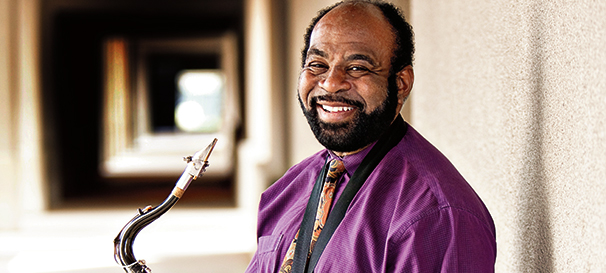
At age 42, Alvin Hayes Jr. was a man of many talents. A teacher of advanced mathematics, he also was a noted jazz musician whose albums ranked high on Billboard charts.
But one September night, the accomplished Long Beach resident began having trouble speaking. "My friends, who were there, told me I was babbling, but I thought I was speaking perfect English," he said. In fact, the musician had suffered a massive stroke.
Alvin and his wife went immediately to Long Beach Medical Center. As a Certified Primary Stroke Center, a Designated Stroke Receiving Center for Los Angeles County and a "Get with the Guidelines – Stroke" program, the hospital has the resources and expertise to provide high-level neurovascular care 24 hours a day.
Minutes after Alvin arrived in the emergency room, he underwent a brain scan to determine the nature and extent of his condition. Once his diagnosis was confirmed, he was treated with a drug to dissolve the life-threatening clot that had formed in his brain.
Alvin survived, but the stroke left him paralyzed on his right side and unable to speak. Encouraged by his Long Beach Medical Center care team, the talented saxophonist never lost hope. While still in intensive care, he welcomed the help of a physical therapist and speech-language pathologist who began working with him to restore lost function.
Shortly afterward he was moved out of the Intensive Care Unit, where he could work with the team from the MemorialCare Stroke Center. This inpatient team started Alvin on a more intensive program of physical, occupational and speech therapy.
After his discharge from the hospital several days later, Alvin continued his rehabilitation through Long Beach Medical Center's Transitional Rehabilitation Services (TRS) program. The outpatient treatment program of its kind in the Los Angeles area, TRS helps patients with a wide range of neurological injuries return successfully to their jobs, family and community.
After six months in the TRS program, Alvin relearned how to walk and talk. "To go from being a teacher to being unable to talk was devastating," he said. "You don't know who you are as a person anymore. But my therapists understood exactly how I felt. They were fantastic."
Today, Alvin helps children with developmental disabilities and says it's the most rewarding work he's ever done. He's back to playing music and spends time encouraging other stroke survivors. "So many wonderful people helped me along the way. Now I try to tell my story to as many people as I can."
Alvin gives back by helping others; you also can make a difference by supporting this life-changing program. Make a gift to support the stroke program or contact the Memorial Medical Center Foundation to learn more about how you can help.